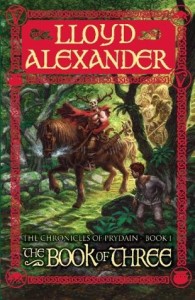 It’s Retro Reads week with Lloyd Alexander! Today, we take a look back to Lloyd Alexander’s marvelous Chronicles of Prydain, the first of which was published 50 years ago. The Prydain Chronicles are modern classics which have influenced contemporary fantasy literature for children and remain highly readable/enjoyable in their own right 50 years after their first publication.
It’s Retro Reads week with Lloyd Alexander! Today, we take a look back to Lloyd Alexander’s marvelous Chronicles of Prydain, the first of which was published 50 years ago. The Prydain Chronicles are modern classics which have influenced contemporary fantasy literature for children and remain highly readable/enjoyable in their own right 50 years after their first publication.
The Prydain Chronicles in Brief
The 5 Prydain Chronicles follow the coming-of-age of young Taran, Assistant Pig-Keeper, and his loyal, eccentric companions: Eilonwy, princess of Llyr, Fflewddur Fflam, an aspiring bard, Doli, a dwarf who can become invisible, and Gurgi, a strange creature with the most delightful expressions (“crunchings and munchings” being a household favorite). As with so many high fantasy greats, these books show a young man of indeterminate origins rising to take on his full responsibilities as high king (oops! Gave away the ending!).
The Prydain Chronicles: Still Captivating
What keeps readers coming back to the Prydain Chronicles 50 years after publication? Many of the same qualities that keep readers coming back to The Lord of the Rings Series: epic battles between good and evil, tremendously well-developed characters, heroic quests, sacrifice, triumph against seemingly insurmountable odds. In fact, the Prydian Chronicles make a great precursor to The Lord of the Rings. Slightly less complex and more approachable to younger readers, these books provide a good introduction to the intricasies and elements of high fantasy.
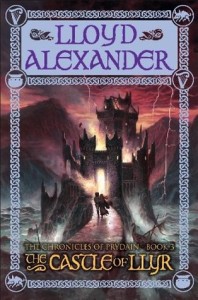 The Prydain Chronicles might be slightly less complex than something like The Lord of the Rings, but please know your young readers before reading this series. I’ve listened to The Black Cauldron with my own three (two almost-7-year-olds and one 8-year-old), and we all enjoyed it immensely. That being said, I had to stop the book a number of times to clarify things like the “cauldron born,” discuss the magical elements in the book, and reassure them in general that the faithful companions obviously don’t die since there are more books about them! If your children are particularly sensitive to otherworldly elements and/or suspense and the violence that comes with good v. evil battles, wait until they are closer to fourth or fifth grade. These books are rich enough for even grown-ups to enjoy; if your family enjoys fantasy, this might be a good series to look into for some family read aloud time. It is worth noting, too, that Lloyd Alexander has such a good sense of when enough is enough; the gory battles aren’t told in excruciating detail. The “cauldron born” never actually appear in the book–just the idea of them. (Notable given today’s cultural fascination with the undead.)
The Prydain Chronicles might be slightly less complex than something like The Lord of the Rings, but please know your young readers before reading this series. I’ve listened to The Black Cauldron with my own three (two almost-7-year-olds and one 8-year-old), and we all enjoyed it immensely. That being said, I had to stop the book a number of times to clarify things like the “cauldron born,” discuss the magical elements in the book, and reassure them in general that the faithful companions obviously don’t die since there are more books about them! If your children are particularly sensitive to otherworldly elements and/or suspense and the violence that comes with good v. evil battles, wait until they are closer to fourth or fifth grade. These books are rich enough for even grown-ups to enjoy; if your family enjoys fantasy, this might be a good series to look into for some family read aloud time. It is worth noting, too, that Lloyd Alexander has such a good sense of when enough is enough; the gory battles aren’t told in excruciating detail. The “cauldron born” never actually appear in the book–just the idea of them. (Notable given today’s cultural fascination with the undead.)
The Prydain Chronicles: Worldview
As with all fantasy (all literature!), we need to take a closer look at the worldview undergirding Prydain. One of the advantages we have with Retro Reads as opposed to contemporary literature is that we remember reading these books as children. Therefore, our analysis factors that in. I grew up in a Christian home (my dad is a pastor), went to a Christian school, and cannot remember a day when I did not trust in Christ as my Savior. I have no memory of reading these books and thinking: “Pagan!” Or of them causing me to yearn after pagan spirituality or anything else along those lines. They affected me much like Tolkien’s works did: I enjoyed “living” in the other world, imagining the magical creatures, getting caught up in the coming-of-age issues with Taran and Eilonwy, following their quests.
As an adult, however, when I reread these books, I recognize much of those pagan elements. Indeed, The Prydain Chronicles were hotly contested in their day for pagan elements. The “cauldron born” in The Black Cauldron are basically zombies: the undead. Druidic magic is referenced. There’s a sense of dualism as well: each person has good and evil warring within him or her and someone can turn either way.
The Prydain Chronicles: Worth Reading!
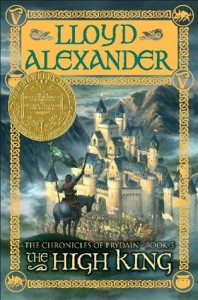 For all their pagan elements, I still think The Prydain Chronicles are worth reading and enjoying. They’re wonderfully well written (one Newbery honor and one Newbery medal amongst other awards). For those who hope their children will be able to appreciate and enjoy high fantasy like Tolkien’s work, series like these are a perfect introduction. And, for all their pagan elements, these books show much of what we hope to find in great literature: good triumphing over evil, the sacrificial cost involved for good to triumph, the maturing of young characters into men and women of principle and great courage, the example of true friendship, the placing of honor/country/cause above selfish interests, … and on and on! If you’re interested in diving into this series with your children, know that it is rich enough to make a great literary unit. The books, in order, are The Book of Three, The Black Cauldron, The Castle of Llyr, Taran Wanderer, and The High King. General age/interest level: 9-12.
For all their pagan elements, I still think The Prydain Chronicles are worth reading and enjoying. They’re wonderfully well written (one Newbery honor and one Newbery medal amongst other awards). For those who hope their children will be able to appreciate and enjoy high fantasy like Tolkien’s work, series like these are a perfect introduction. And, for all their pagan elements, these books show much of what we hope to find in great literature: good triumphing over evil, the sacrificial cost involved for good to triumph, the maturing of young characters into men and women of principle and great courage, the example of true friendship, the placing of honor/country/cause above selfish interests, … and on and on! If you’re interested in diving into this series with your children, know that it is rich enough to make a great literary unit. The books, in order, are The Book of Three, The Black Cauldron, The Castle of Llyr, Taran Wanderer, and The High King. General age/interest level: 9-12.
Please let us know what your favorite Lloyd Alexander book is in the comments. We’d love to hear from you.
Janie covered another Retro Reads fantasy gem earlier this week: The Sword in the Stone. Tomorrow, Hayley will look at Alexander’s Vesper Holly series, and Megan will look at his picture books on Friday. Be sure to check those out!
cover images from goodreads
Support our writers and help keep Redeemed Reader ad-free by joining the Redeemed Reader Fellowship.
Stay Up to Date!
Get the information you need to make wise choices about books for your children and teens.
Our weekly newsletter includes our latest reviews, related links from around the web, a featured book list, book trivia, and more. We never sell your information. You may unsubscribe at any time.
We'd love to hear from you!
Our comments are now limited to our members (both Silver and Golden Key). Members, you just need to log in with your normal log-in credentials!
Not a member yet? You can join the Silver Key ($2.99/month) for a free 2-week trial. Cancel at any time. Find out more about membership here.
11 Comments
Leave a Comment
You must be logged in to post a comment.

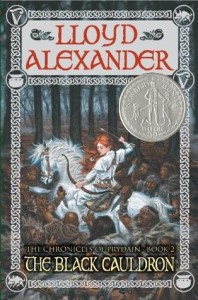
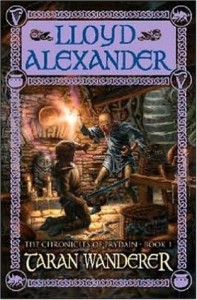

I echo the sincere recommendation of these books–I read them only about twelve years ago and found them delightful. Even though they aren’t Christian books, the common grace thread of good-versus-evil is clear.
Now Betsy dear, you need a follow-up explanation: what is the difference between high fantasy and fantasy? 🙂
Wonderful review, Betsy! It makes me want to read the Prydain Chronicles again so that I can appreciate them from a grown-up perspective 🙂
As a young reader, I think I consumed most of Lloyd Alexander’s books. Two that I particularly loved and read multiple times were “The Arkadians” and “Gypsy Rizka.”
Ha ha ha, Megan. That took us an entire class period at the graduate level to discuss and the details are still fuzzy! 😉
The real question that still remains: does Harry Potter count as “high fantasy”?
For those readers of ours who are unclear on the differences, we can sum up:
**takes place in a completely alternate world (this means that Narnia is only questionably high fantasy–we nerds would then debate)
**has magical/otherworldly creatures (dwarves, trolls, faeries, etc.)
**epic good v. evil battles
**often has quest/map/dragon elements
It’s a sub genre of “fantasy” which would include everything from magical realism to scifi.
This is a series I missed as a child. I got a nice set at a used bookstore for my daughter, but we haven’t gotten to them yet. How would you compare these to Susan Cooper’s The Dark Is Rising Series?
Oooh, Cathy, I love both of these series! They’re similar in age/interest level. Cooper’s series is based on the Arthurian legend and some Welsh mythology, and Alexander’s books are grounded in Welsh mythology and his own world creation. Cooper’s works straddle the present world a touch (or, at least, appear to be set in our own world at times). I think Cooper’s works are a touch more intense with more dualism/mythological elements present. They’re both great reads, but I might start with Alexander’s works. I don’t know if that answers your question or not. It’s been a while since I read Cooper’s works. But my MA thesis looked at the Welsh “wise woman” in mid-20th century fantasy; both Eilonwy (from Alexander’s Prydain books) and the Green Witch from Cooper’s featured in it ;-).
My children and I just finished The Black Cauldron last week. We’re hooked!
https://www.hopeisthewordblog.com/2014/03/13/the-black-cauldron-by-lloyd-alexander/
Thanks, Betsy!
Our family reads these through aloud almost as often as the Narnia books. In fact, when we were stumped for another boy name we could really get behind, our older kids helped name their youngest brother: Taran.
Glad to hear you second our recommendation, Dani! I actually hadn’t heard of these books, and since our kids are studying the Middle Ages this year, I am going to have to track them down asap.
[…] mark of a very successful read-aloud experience. I loved this series as much as the girls did. This Redeemed Reader post gives a nice one-stop-shop synopsis and evaluation of the […]
No mention of the Disney movie that failed but nonetheless developed a cult following on video. Disney is actually trying to get it right this time.